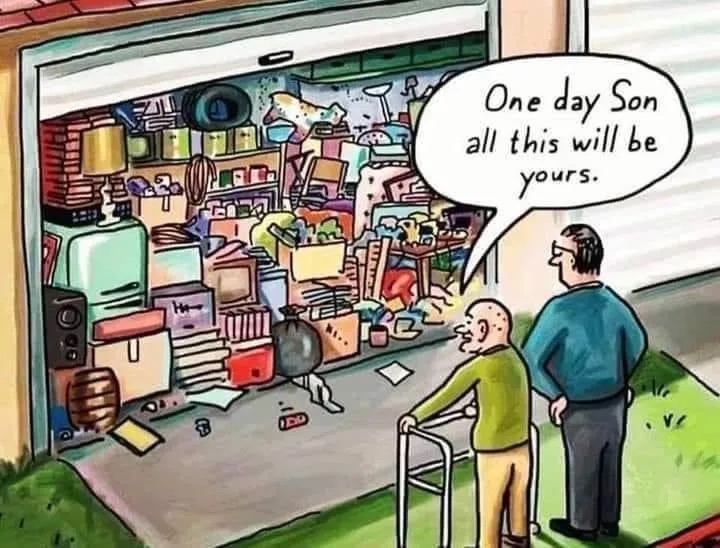
We’ve transitioned into the season of “stuff,” in more ways than one. Last week we stuffed ourselves at our respective Thanksgiving feasts. Then, on Friday, many of us bought more stuff on Black Friday, and the next day from local merchants on “Shop Small Saturday,” and then even more stuff yesterday on “Cyber Monday.” Some of that stuff is destined for under the tree on Christmas morning, and some of that stuff is just for ourselves. And we’re likely looking forward to the next big feast on the horizon, Christmas dinner.
By the way, the average American stuffs themselves with 3,00-4,500 calories worth of feast at Thanksgiving dinner. And on average Americans pack on an additional pound of weight between Thanksgiving and New Year’s Day, extra padding which we don’t tend to lose in the spring and summer. You can see how that might add up over the course of adulthood.
But we’re not here to talk about health or weight loss or anything like that. No, let’s acknowledge that it’s a season of stuff, of stuffing ourselves, of indulgence and overindulgence. But does all that stuff — the stuff overfills out bellies, the stuff we accumulate — make us happy?
Unsurprisingly, there’s some research and advice on these points. As discussed in this article from The Atlantic, there’s evidence that overindulgence at the table, in the company of friends, can bring you joy and not a lot of next-day self-recrimination if you keep a few things in mind:
- Don’t extend your feast past Thursday — Seconds and thirds are fine on the day, but get back to your normal eating habits ASAP, and maybe throw in a long walk or two for good measure.
- Don’t forget the thanks part — As we talked about last week, gratitude has all kinds of positive benefits on our lives and outlooks.
- Don’t beat yourself up — Guilt about your overeating won’t make you feel any better, and will diminish the joy of gathering and celebrating the holidays with your loved ones.
So to start our conversation this evening, we’re going to kick off with a consideration of the above ideas. When you indulge, do you overindulge? If so, why do you do it and how do you feel about it? Does next-day guilt make you appreciate the celebration less? And how does it make you feel about feasts to come? What do you think about the advice above?
Of course the season of stuff extends beyond the table to material acquisition and the things and possessions that we surround ourselves and fill our homes and living spaces with. Some of us call this clutter. The rest of us call it things we can’t live without. If you’ve been paying attention to cultural trends over the last few years you are probably aware of some of the more popular approaches to the decluttering movement. Yes, we’re talking about tidiness guru Marie Kondo and “Swedish death cleaning.”
Kondo’s KonMari tidying method can be boiled down to something like this:
The KonMari method has essentially two parts: discarding and sorting.
First comes the discarding. You collect everything you own in a specific category — clothes, books, papers, and so on — and you heap it into an enormous pile on the floor. You stare at the mountain of stuff and you feel, deep in your soul, how much stuff you have and how unnecessary most of it is.
You pick up each thing and you ask yourself: Does this spark joy in my life? If it does, Kondo says, you will know. … If the item sparks joy, you may keep it. If it doesn’t, you are instructed to thank it for everything it has brought to your life — even if it has only taught you that you don’t actually like items like that — and then you discard it.
There is some irony in the fact that Kondo’s webpage includes a shop where you can purchase all the things you never knew you needed to create spaces that spark joy in your life and home. Probably to replace all the other stuff you just threw away. But we digress.
Swedish death cleaning is a different, perhaps slightly morbid, approach to winnowing all the stuff we’ve accumulated over the years. The basic idea, as described in this article from NBC News is this:
[O]ne of these days you’ll find yourself partaking in a new cleaning exercise designed to essentially help you prepare for death.
No, it’s not as morbid as it sounds. It’s actually quite practical.
Once you reach the end of middle age (or sooner if you feel like it, or later if you’re late to the exercise), you get rid of all the stuff you’ve accumulated that you don’t need anymore — so that no one else has to do it for you after you pass. …
The benefit of death cleaning to your loved ones who won’t have to do it for you is fairly straightforward. But what about the happiness and enjoyment on your end? Psychology and sociology offer some interesting reasons why going through our possessions, paring down and cleaning out really can be helpful — and why it really might be prudent to not wait too long before jumping on the trend.
So in the second part of our conversation tonight we’re going to talk about our relationship with our material stuff. Does the clutter in your life bring you joy? More importantly, should you just discard all the things in your life that fail to “spark joy?” How hard would it be for you to pare down and clean out? Do you think you’d benefit by doing so?
Join us for the discussion this evening as we contemplate the season of stuff and what we think about it. The conversation starts at 7pm at 313 Pizza Bar in downtown Lake Orion.